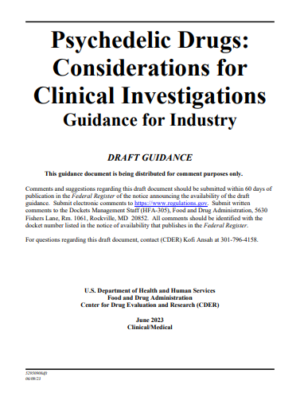On June 23rd of this year, the U.S. Food and Drug Administration published a new draft guidance intended to advise researchers on study design when investigating the potential of psychedelics for treating medical conditions, including psychiatric or substance use disorders.
The outlined principles are meant to support the ethical conduct and integrity of psychedelic clinical studies and ensure the reliability of the study results.
Within the guidance, the FDA notes that the term “psychedelics” refers to “classic psychedelics,” such as psilocybin and LSD, which are understood to be 5-HT2 agonists, as well as “entactogens” or “empathogens” like MDMA.
While research into psychedelics for the treatment of mental health conditions such as depression, PTSD, and anxiety continues to ramp up, certain challenges arise when designing clinical studies to evaluate the safety and efficacy of these potentially therapeutic agents. Although psychedelic drug developers and researchers must abide by the same evidentiary standards and regulations in order to obtain FDA approval, the Agency noted that psychedelics have some “unusual characteristics” that necessitate special considerations when discussing their clinical trials design. For instance, data interpretation may be challenging for certain psychedelics that have both rapid-onset and long-term benefits after administering only one or a few doses.
“Psychedelic drugs show initial promise as potential treatments for mood, anxiety and substance use disorders. However, these are still investigational products. Sponsors evaluating the therapeutic potential of these drugs should consider their unique characteristics when designing clinical studies,” said Tiffany Farchione, M.D., director of the Division of Psychiatry in the FDA’s Center for Drug Evaluation and Research. “By publishing this draft guidance, the FDA hopes to outline the challenges inherent in designing psychedelic drug development programs and provide information on how to address these challenges. The goal is to help researchers design studies that will yield interpretable results that will be capable of supporting future drug applications.”
The guidance highlights some basic considerations throughout the drug-development process, such as data collection, patient safety, and new-drug-development requirements.
According to the document, due to the hallucinogenic nature of these substances and their capacity to produce mood and cognitive changes, psychedelics could lead to potential abuse, which is a drug safety issue that necessitates safety measures to prevent “misuse” throughout clinical development. Since psychedelics are still listed as Schedule I substances, the guidance specifies that psychedelic researchers conducting studies under an Investigational New Drug Application must act in accordance with the applicable Drug Enforcement Administration (DEA) regulatory requirements. The document also addresses safety monitoring considerations, dose-response characterization, durability of treatment effect, and the role of psychotherapy in the context of psychedelic drug development.
According to the text, since psychedelic drug development is still in its nascent stage, there is limited knowledge or guidelines for creating programs that support the approval of psychedelic medicines. Therefore, instead of providing specific study design recommendations, study sponsors, including academic sponsor-investigators who are investigating these drugs’ therapeutic potential, should follow some “foundational constructs”.
People wishing to comment on the provided FDA guidance draft can do so for the next 60 days.

